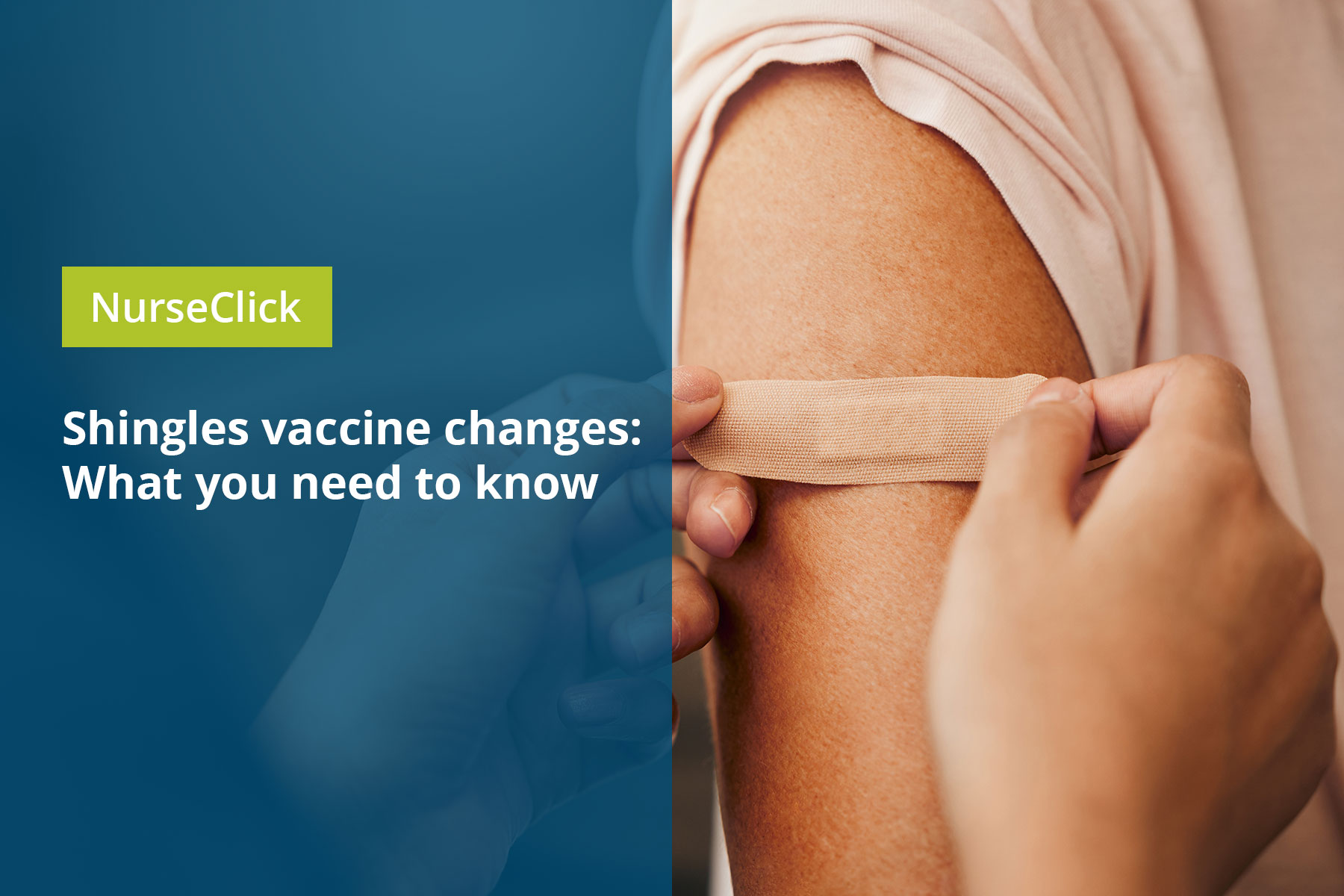Recently, the Australian Technical Advisory Group on Immunisation (ATAGI) provided updates to the shingles vaccine schedule in Australia. As our understanding of the disease advances and vaccination methods improve, these updates are crucial for ensuring the health of Australians. As health practitioners, we are accountable for familiarising ourselves with these changes so we can provide the best possible guidance to patients and their families.
In this article:
What is shingles?
Shingles, also known as herpes zoster, is caused by the Varicella-Zoster Virus (VZV) — the same virus that causes varicella (chickenpox). After an individual has recovered from chickenpox, the VZV can remain dormant in the body and reactivate later, leading to shingles (ATAGI, 2022).
Symptoms of shingles include a painful rash that usually appears as a strip of blisters on one side of the body or face. The rash can last approximately 10-15 days. Other symptoms may include fever, headache, and fatigue. The most significant concern for many individuals is the pain associated with shingles, which can be severe and last long after the rash has healed. This condition is known as post-herpetic neuralgia (PHN). PHN is defined as persistent chronic neuropathic pain occurring at the site of the rash. This pain can last for months and can be difficult to treat, severely impacting quality of life (ATAGI, 2022; National Centre for Immunisation Research and Surveillance Australia, 2022).
Who is at risk of shingles?
Anyone who has had chickenpox is at risk of developing shingles. However, the risk increases with age, especially after the age of 50. People with weakened/compromised immune systems due to conditions like HIV, cancer, or those who take certain medications such as some immunosuppressants are also at a higher risk of this disease. Adults who live in the same household with immunocompromised individuals are recommended to get vaccinated (Department of Health and Aged Care, 2023a).
What are the changes made by ATAGI?
ATAGI has updated the recommendations for the shingles vaccine. Previously, Zostavax® was free for immunocompetent adults aged 70 years. Catch-up vaccination was available for adults aged 71-79 years. With the new schedule, starting from 1 November 2023, the shingles vaccine Shingrix® replaced Zostavax® on the National Immunisation Program (NIP) schedule and is available for free for people most at risk of developing shingles and its complications (Australian Government Department of Health and Aged Care, 2023b).
Shingrix® is available for people aged ≥18 years. A two-dose course (two to six months apart) of Shingrix® will be available for free for:
- people aged 65 years and older;
- First Nations people aged 50 years and older;
- immunocompromised people aged 18 years and older with the following medical conditions:
- haemopoietic stem cell transplant
- solid organ transplant
- haematological malignancy
- advanced or untreated HIV (Australian Government Department of Health and Aged Care, 2023a).
Unlike Zostavax®, Shingrix® is not a live vaccine, making it safe for individuals aged 18 years and over who are immunocompromised (ATAGI, 2022).
A note for Nurse Immunisers
If you are administering the shingles vaccine, it is critical to stay up-to-date with the most recent guidelines outlined in the Australian Immunisation Handbook (AIH). It is important to understand the nuances of the recommendations, particularly for those in high-risk groups.
While the vaccine reduces the risk of disease, it doesn’t guarantee an individual won’t develop shingles. It’s essential to educate patients about shingles’ signs, symptoms and the importance of early treatment.
For more information on the updates, refer to the following resources:
- National Immunisation Program – changes to shingles vaccination from 1 November 2023
- Latest NIP schedule
- Australian Immunisation Handbook – Zoster (herpes zoster)
- National Immunisation Program – Shingles program advice for vaccination providers
- National Immunisation Program – Shingles program advice for vaccination consumers
Nurses are at the forefront of immunisation efforts, playing a pivotal role in both educating consumers and delivering vaccines. Visit the ACN Immunisation Hub to access immunisation news and information and explore opportunities to deepen your expertise in this critical field. Progress your career by becoming a Nurse Immuniser through our specialised 347 National Immunisation Program for Healthcare Practitioners course or refresh your knowledge with a CPD course.
Eva Liu
Eva is a Nurse Educator at the Australian College of Nursing for the National Immunisation Program for Health Practitioners. Standing at the intersection of nursing practice, academia, and continuous professional development, Eva’s contributions to nursing extend beyond her 20 years as a registered nurse and her experience as a clinical educator, infection control and safe practice manager and a sessional academic at universities. With a Master’s degree in Nursing and a post-graduate qualification in infection control and quality auditing, Eva brings a unique blend of practical insights and academic depth in nursing.
References
- Australian Government Department of Health and Aged Care. (2023a, October 8). National Immunisation Program – changes to shingles vaccination from 1 November 2023. https://www.health.gov.au/news/national-immunisation-program-changes-to-shingles-vaccination-from-1-november-2023.
- Australian Government Department of Health and Aged Care. (2023b, October 13). Shingles (herpes zoster) vaccine. https://www.health.gov.au/topics/immunisation/vaccines/shingles-herpes-zoster-immunisation-service.
- Australian Technical Advisory Group on Immunisation. (2022, May 19). Zoster (herpes zoster). The Australian Immunisation Handbook. https://immunisationhandbook.health.gov.au/contents/vaccine-preventable-diseases/zoster-herpes-zoster#vaccines-dosage-and-administration.
- National Centre for Immunisation Research and Surveillance Australia. (2022). Zoster vaccines for Australian adults. https://ncirs.org.au/sites/default/files/2022-05/Zoster%20vaccines%20for%20Australian%20adults%20-%20Factsheet_11_May_2022_Final.pdf.





